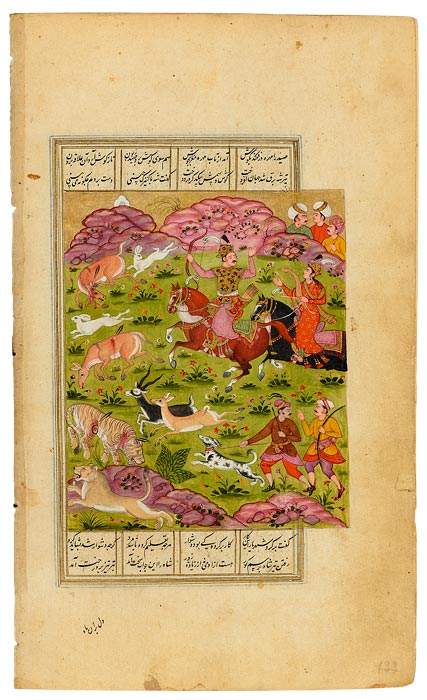
This episode appears in the Haft Paikar (Seven Princesses), the last part (1197) of the Persian poet Niẓāmī's Khamsa (Quintet). It is essentially a romanticized biography of Bahrām Gūr, a Persian king (r. 421–438) and a renowned hunter and lover.
One day, while hunting with Fitna, his harpist slave girl, Bahrām Gūr slays both a tiger and a wild ass. Unimpressed, Fitna observes that hunting is a noble pastime and that he had been trained in that art as a youth. She then challenges him to pin a wild ass's hind hoof to its ear—a trick requiring two arrows. The first grazes the animal's ear, causing it to raise its hoof to scratch it, while the second immediately pins the raised hoof to the ear. Bahrām's nickname, coincidentally, is Gūr, the Persian term for "wild ass." The trick shot is depicted at the upper left, while two hunters approach the felled lion at the lower right.
Persian poetry
The Persians loved their poetry and their poets, though the Qur˒an warned against believing their words (sura 69.41) and "those straying in evil who follow them" (sura 26.224). While Arabic was the first language of Islam and the language of the Qur˒an, Persian was favored by poets. Even Firdausī's (940–1020) celebrated Shāhnāma (Book of Kings), the national epic of Persian, was written in verse—some 50,000 couplets! Rūmī (1207–1273), the best known of the Sufi poets, put poetry in perspective when he wrote, "A hundred thousand books of poetry existed / Before the word of the illiterate [Prophet] they were put to shame!" (Masnavī I, 529). Presented here are illustrations of Firdausī's Shāhnāma as well as works by Sa˓ dī (ca.1184–1292), Hāfiz (ca. 1320–1389), and Jāmī (1414–1492), regarded as the last of the great Sufi poets. Also featured are illustrations from each of the five poems of the Khamsa (Quintet), by Niẓāmī (ca. 1141–1209), especially Lailā and Majnūn (The Persian Romeo and Juliet) and Bahrām Gūr's Seven Princesses.
